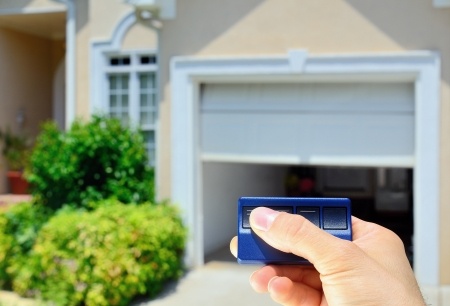Garage Doors Can Be Dangerous
December 15, 2014 | Category: Child Injuries | ShareThe Consumer Product Safety Commission (CPSC) estimates that every year there are 30 thousand injuries caused by garage doors. They further report that many of these injuries, and even deaths, happen to children. In 2013, a 3-year-old girl in Maryland died as the result of her being able to reach the garage door opener button from inside the garage. The garage door came down on her as she passed under it.
There are two types of safety mechanisms in automatic garage door systems. The first are photo-electric sensors placed on garage door jams and sidewalls. These sensors react when an object is placed in front of them by reversing, or stopping, the action of the garage door's movement. The second are pressure-sensitive sensors on the bottom of garage doors. These pressure-sensitive sensors react when the garage door comes against an object by activating the safety reverse or shut-off systems.
 The CPSC required in 1993 that all automatic garage door systems manufactured after 1993 have built-in safety reversing and automatic shut-off systems. In spite of this requirement which was enacted to help prevent accidents, the CPSC reported that 40 percent of the safety systems worked improperly. The reversing system failed to work as intended, and the garage doors, with an average weight of 400 pounds, came down quickly with enough force to crush a small child. When the CPSC tested 50 garage doors, 88 percent of their safety mechanisms functioned as intended when coming down on a block of wood. This was not the case when the doors were tested with a child-size cardiopulmonary resuscitation mannequin in the supine position (lying face upward). In these tests, the automatic garage doors only worked 44 percent of the time.
The CPSC required in 1993 that all automatic garage door systems manufactured after 1993 have built-in safety reversing and automatic shut-off systems. In spite of this requirement which was enacted to help prevent accidents, the CPSC reported that 40 percent of the safety systems worked improperly. The reversing system failed to work as intended, and the garage doors, with an average weight of 400 pounds, came down quickly with enough force to crush a small child. When the CPSC tested 50 garage doors, 88 percent of their safety mechanisms functioned as intended when coming down on a block of wood. This was not the case when the doors were tested with a child-size cardiopulmonary resuscitation mannequin in the supine position (lying face upward). In these tests, the automatic garage doors only worked 44 percent of the time.
Garage Door Child Safety.com lists the following "Top 10 Garage Door Dangers":
- Children riding a garage door.
- Lead paint concerns.
- Entrapment issues.
- The ever-present risk of a garage door spring.
- Dangers of a falling garage door.
- Possible photo eye concerns.
- Over-insulating and sealing a garage door can create a danger.
- Product quality and door installation concerns.
- Getting fingers caught in a section joint.
- Dangers of carbon monoxide in the garage.
A garage door safety guide is provided on the International Door Association (IDA) website. In this guide IDA reminds everyone that, "Garage door openers are not toys." They recommend teaching children how to be safe around garage doors and not to play near them or stand or walk under them. Garage door system maintenance should be done monthly, according to IDA. Following is the checklist they provide:
|
Monthly Maintenance Checklist |
|
|
Garage Door Opener
|
Garage Door
|
There have also been recalls of automatic garage door openers. In February 2014, Genie garage door openers were recalled because of potential fire hazards as the control board may overheat and cause a fire. The CPSC report stated that there are approximately 10 thousand recalled units in the United States and 8 thousand in Canada. Those recalled were described as:
Genie, models PowerMax 1200 and 1500, and Genie Pro, models TriloG 1200 and 1500, screw- drive garage door openers. The garage openers are gray and have a rating of ¾ HPc for the models ending in 1200 and 1 HPc for the models ending in 1500. “Genie” and the model name appear on both sides of the opener.
The Genie Company of Ohio, the manufacturer, recommends that consumers immediately stop using and unplug the recalled garage opener. Genie provides a free repair kit with instructions.
"Accidents involving garage doors can happen as the result of design defects and/or poor installation. It is the responsibility of the manufacturer and installer to be sure the automatic garage door systems are made without design, or other, defects and are installed correctly. Should you or a family member be injured as the result of the failure of an automatic garage door system, contact our Florida Defective Products Attorney for assistance," says Attorney Randall Spivey, of Spivey Law Firm, Personal Injury Attorneys, P.A.
Florida Defective Products Attorney, Randall L. Spivey is a Board Certified Trial Attorney – the highest recognition for competence bestowed by the Florida Bar and a distinction earned by just one (1%) percent of Florida attorneys. He has handled over 2,000 personal injury and wrongful death cases throughout Florida. For a free and confidential consultation to discuss your legal rights, contact the Spivey Law Firm, Personal Injury Attorneys, P.A., in Lee County at 239.337.7483 or toll free at 1.888.477.4839,or by email to Randall@SpiveyLaw.com. Visit SpiveyLaw.com for more information. You can contact Spivey Law Firm, Personal Injury Attorneys, P.A.in Charlotte County at 941.764.7748 and in Collier County 239.793.7748.

